Microsoft Teams allows organizations to translate any collaborative scenario into a virtual workspace where your team can apply various use cases. This is where they can work together to achieve their objectives. Teams has taken collaboration to a whole new level, making it the perfect solution for restructuring traditional work models and converting them into a more efficient and productive form.
In this article we will walk you through 10 different scenarios and corresponding use cases for Microsoft Teams that you can apply for your internal processes.
You can learn more about how to define Microsoft Teams scenarios and use cases in this blog post.
- Use cases for department-wide collaboration
- Use cases for Crisis management
- Use cases for Product launch
- Use cases for Marketing and PR campaigns
- Use cases for Onboarding
- Use cases for Recruitment
- Use cases for Construction/Renovation management
- Use cases for Procurement
- Use cases for Consulting
- Use cases for Account management
Use cases for department-wide collaboration
Employees working in the same department have to communicate every day about various tasks and projects assigned to them individually or together as a team. The more projects they have, the more files and data they will generate. And while they could be in the same office, they might also be in different geographic locations. Microsoft Teams provides a department-wide collaboration platform allowing team members to interact efficiently towards their goals. For instance, you want to have a team for each department in your healthcare organization. Here are the Microsoft Teams use cases for this scenario:
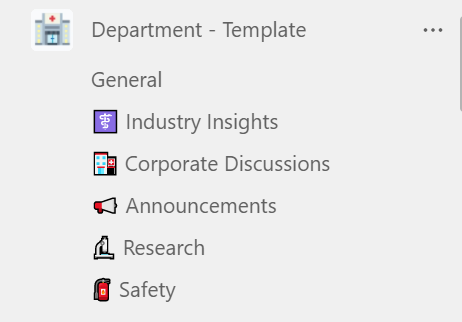
- Create separate channels for each segment, like industry insights, research, announcements, corporate news, etc.
- Collaborate and communicate through instant chats and channel conversations.
- Arrange department-wide meetings, consulting sessions and live events.
- Upload all the documentation needed and share it with all employees: suggestions, reports, guidelines, and updates.
- Generate proposals, allow co-editing for faster results, and get official approvals.
Use cases for Crisis management
When something critical happens, multiple departments and stakeholders within a company become involved to respond quickly. In these cases, communication level rises while all the stakeholders analyze the situation, suggest solutions, get approvals, and keep everyone informed.
Microsoft Teams helps coordinate all the efforts and saves lots of communication time. Instead of making calls, exchanging emails, and transferring files, everyone can collaborate under one platform. For instance, a power supply for a telecommunication provider went out of service, causing the service to shut down in a central region of the city. Here are some use cases for Crisis Management scenario in Microsoft Teams:
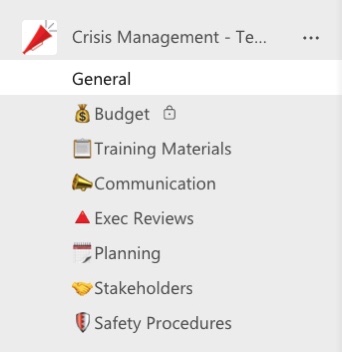
- Create a team dedicated to the crisis and invite all corresponding members. That can be engineering, logistics, procurement, and technical managers, and their team members.
- Create different channels for each team based on their role in solving the issue. For example, channels for buying a new generator, communicating with clients, replacing the broken power supply.
- Channel allow to have focused discussions, find solutions, invite external professionals (for shared channels), share files and valuable information.
- Hold online meetings with the onsite team to ensure the process is going as planned and get instant updates.
- Sign approvals, confirm purchase orders and keep a record of all documents and invoices involved in this crisis.
→Download: Catalog of Microsoft Teams Use Cases
Use cases for Product launch
The sensitivity of launching a product relies on the high volume of internal and external communication and coordination before the official launch. Everyone has to get involved, and all stakeholders must approve their assigned parts. Furthermore, this is usually a cross-departmental process that requires coordinated actions from different teams. Microsoft Teams offers all the necessary tools to keep everything running smoothly under one collaboration platform. The company can create a new team for each product launch and add respective channels. Channels can represent departments or main role: production, marketing, sales, legal, and quality departments.
For instance, a software company wants to release a new mobile application. Here is what they can do with Microsoft Teams:

- Create a new team for the product launch and add corresponding channels.
- Add the right people to the team and assign tasks for everyone in Planner.
- Collaborate with your team on the design, campaign preparation, communicate on the promotion strategy and send approvals to the top management through Approvals app.
- Communications, files, polls, and other valuable information will be saved and documented without human admin work.
Use cases for Marketing and PR campaigns
Digital and social media exposure made marketing and PR campaigns more complex than ever. Starting a campaign requires coordinating with many external parties to ensure enough media coverage and reach. Let’s see what use cases you can address with Microsoft Teams for marketing scenario.
Say a fashion brand is about to release their winter collection, and they need to start a nationwide marketing campaign. Here is what they can do with Microsoft Teams:

- Create a new team for the campaign and add channels for each collaborative topic. That can be budget, planning, promotion plan, customer analysis, and others,
- Invite account managers and marketers to communicate around the campaign.
- Invite media representatives like celebrities’ managers, influencers, and website admins to the team or shared channels as guests.
- Share all required documentation, collaborate on the campaign planning, prepare presentations, assign tasks in Planner, etc.
- Hold online meetings, conversations, share expectations and receive quotes.
- Get the quotes signed by management and communicate with the financial department to issue money transfers.
Use cases for Onboarding
The onboarding process contributes to considerable expenses in every company. Leading new hires through the different stages of the process and the amount of redundancy could all be organized and templatized using Microsoft teams and its integrated features.
Here are some use cases for the onboarding scenario in Microsoft Teams:
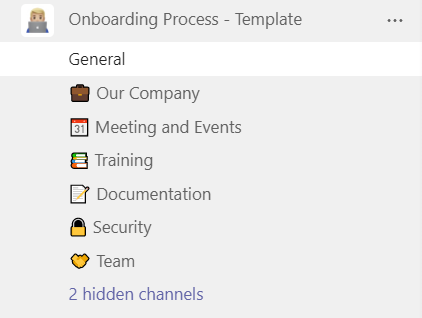
- Create an onboarding team and add channels for different stages of the onboarding process. Then invite the new hire, their manager, and the HR to follow up with the new employee.
- Prepare onboarding tasks in Planner so that they know immediately where to start,
- Upload all the necessary documentation they should get acquainted with.
- Add training materials and resources as files, attached links or videos in Microsoft Stream.
- Hold regular 1-1 and team meetings, and share feedback on their progress.
You can also create a pre-built workspace through Collaboration Templates that you can then replicate to create ready-to-go teams with all the necessary tools and content already included.
Use cases for Recruitment
Recruiters can also use Microsoft teams to organize multi-stage recruitment and ensure a smooth experience that saves everyone’s time across the process. For instance, a company hires a new accountant for the financial department. Here is what they can do with Microsoft Teams:
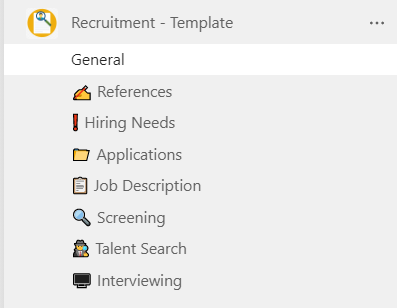
- Create a recruitment workspace where all recruitment processes will take place.
- Create a channel for the financial department and invite the financial manager.
- Work together on the job description, discuss hiring needs and screening process, upload and review applications and schedule interviews.
- Send an approval request to the financial manager with the CV, and first meeting notes.
- When the financial manager approves the request, a new meeting can be arranged within Microsoft Teams for the new candidate with the financial manager for the final decision.
- Upon the interview, the HR officer and the financial manager can have private conversations about the status and decisions or share them in an Excel spreadsheet. They can co-edit to add a rating, reviews, and final decision.
Use cases for Construction/Renovation management
Working on a construction or renovation site requires coordinated actions from multiple stakeholders such as first-line workers, engineers, contractors, suppliers, management, the client, and others.
Microsoft Teams provides a perfect collaboration platform that will keep everyone under the same roof to communicate and collaborate smoothly and productively. Its chat, channel and online meeting features and the ability to use the app from mobile devices make it easy to use for on-site managers and front-line workers. Additionally, you can integrate a Walkie-Talkie app that will make onsite communication far easier.

Let’s consider building a new hotel as an example. Here is what you can do with Microsoft Teams:
- Create a workspace for the new construction site, and invite the project manager, engineers, contractors, construction workers, the client and other stakeholders involved in the process.
- Add channels that will correspond to the collaboration topics for completing the construction site: planning, budget, legal, sustainability, security, quality, etc.
- Schedule regular online meetings for a constant update.
- Share all the required legal, project and training documentation. Upload safety instructions, guidelines and other files required for the construction project.
- Integrate the necessary task management tools (Planner, Asana, Trello, etc.), and other apps that your team uses daily (Walkie-Talkie, Lists, Shifts, Yammer, and others)
- Send projects, budgets, contracts, and other documents that require signatures and approval through the Approvals app.
Use cases for Procurement
In the procurement department, both managers and procurement officials seek a way to keep proof of spending, invoices, and conversations with different suppliers. Microsoft Teams offers a comprehensive file management capability with its built-in SharePoint features. For instance, a computer hardware company buys various parts from the local and international markets. Here are the Microsoft Teams use cases for this scenario:
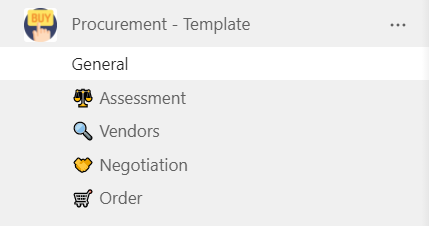
- Create a workspace for the procurement process.
- Create such channels as: assessment, vendors, negotiation, order.
- Share lists of requested items and receive price quotes.
- Keep all conversations inside channels.
- Invite accountants at any moment to review a price offer and approve issuing the invoice.
Use cases for Consulting
Professional consultancy providers deal with different types of clients, and each client is a unique case that requires a unique approach. Microsoft Teams can help organize this process with its security features and its integration with other service providers like ServiceNow. It forms a pool of knowledge that can be referenced with future clients to find out more about previous experience.
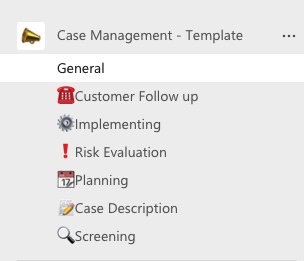
For example, a commercial consultancy agency that works with all SME retail businesses wants to organize their work digitally. Here is what they can do with Microsoft Teams:
- Create a team for each case or deal and assign corresponding consultants to follow up with clients.
- Develop forms and have the latest client fill out all the information about the business needs and requirements.
- Share proposals, lists of goals, contracts, and other related documents.
- Keep all conversations in one place and invite any 3rd party professional who might need to complete the work as a guest.
- Share all helpful information in the pool of knowledge created by ServiceNow for the whole workspace to use later with new clients.
Use cases for Account management
Dealing with different clients about similar issues could be a bit confusing. The more clients, the more complicated it gets, and the account manager should follow up with everyone about their requirements and preferences. For instance, a digital marketing agency assigns an account manager to each client. Here is what they can do with Microsoft Teams:
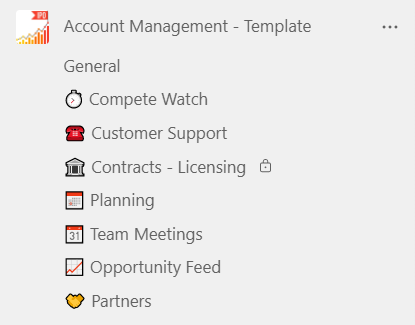
- Create a team for each account and invite account managers as well as members of product, sales, marketing, customer support and other teams that can be involved in the process.
- Collaborate internally on account’s issues and requests.
- Share the roadmap, event planner, and potential targets with the client.
- Share instruction files and add client-personalized notes instantly.
No matter what kind of business you have or what type of issues your team faces in their everyday activities, you can always rely on Microsoft Teams to provide a solid collaboration experience that would push their work to the limits and ensure better results.
Explore our list of 30+ use cases for Microsoft Teams.

